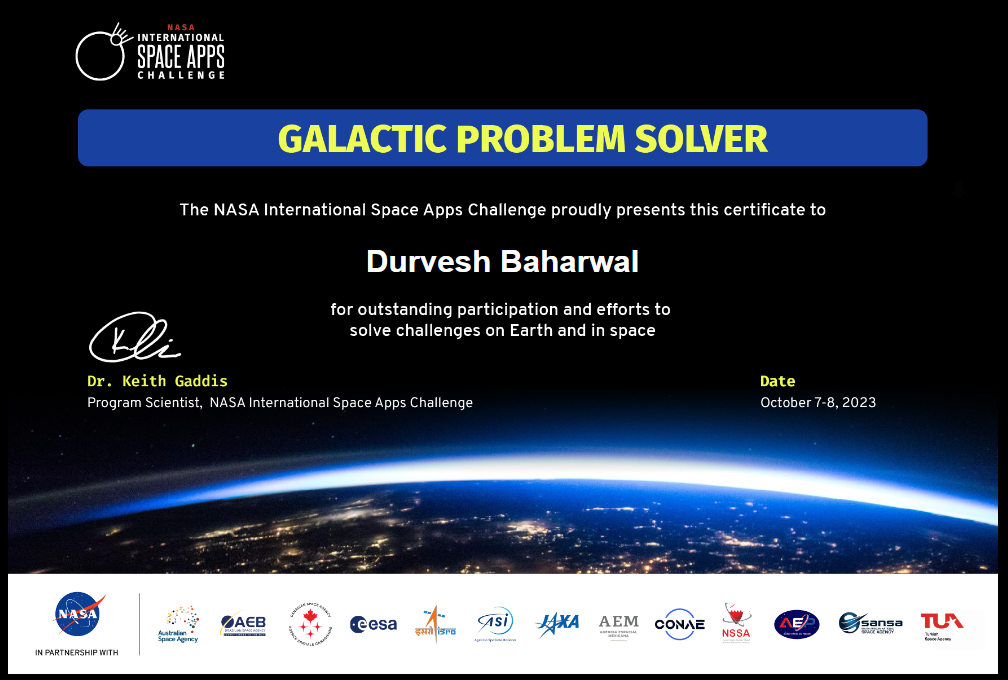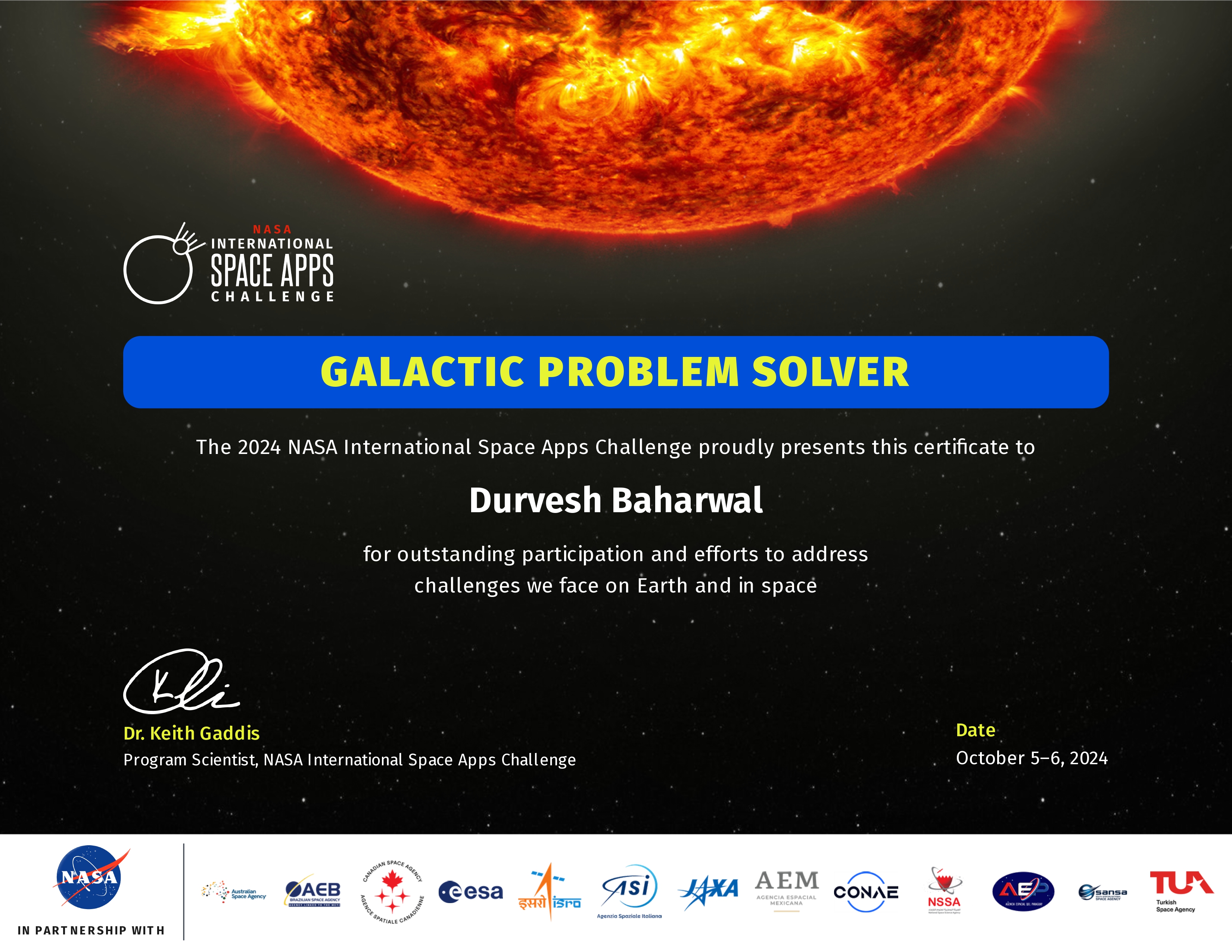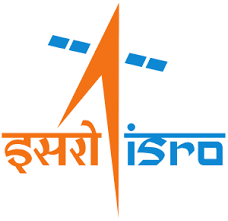Data Scientist, AI Engineer, Web Developer & Researcher
Exploring the frontiers of technology and nature
ABOUT ME
Hello! I’m Durvesh Baharwal, an AI Engineer and Data Scientist with a passion for solving complex problems through innovative technology. With a Bachelor’s degree in Artificial Intelligence and Data Science Engineering, I have gained hands-on experience in machine learning, data analytics, and software development.
Throughout my journey, I’ve had the privilege of working with organizations like ISRO, where I developed algorithms that enhanced satellite navigation accuracy, and participated in prestigious events such as the NASA Space Apps Challenge. My expertise spans Python, SQL, JavaScript, and I enjoy diving into challenges involving data visualization, machine learning models, and GNSS positioning systems.
Beyond coding, I’m an avid mountaineer and trek leader, having led over 50 treks in the Sahyadri mountain range. I find inspiration in the outdoors and often apply the resilience and problem-solving skills I’ve developed during treks to my work in AI and data science.
I’m always looking to collaborate on exciting projects that push the boundaries of technology. Let’s connect and build something remarkable together!
Experience
Research Intern
Engineered and deployed a Kalman Filter algorithm for satellite navigation systems, improving positioning accuracy by 37%. Programmed a MATLAB simulation of the Moving Window Average technique for 5 epoch pseudorange averaging. Increased processing speed by 36% and improving data accuracy for 100+ test runs.
PROJECTS
Enhancing GPS Positioning Accuracy Using Machine Learning
Developed a hybrid GNSS positioning system using Least Square Estimation and Machine Learning Achieving 4.48m accuracy. Minimized Mean Absolute Error for Random Forest Regression up to 0.000122
Seismic Detection Across the Solar System
Statistically programmed a Python algorithm to detect seismic events in noisy data from Apollo and Mars InSight missions and Applied 5+ algorithms Achieving 96% accuracy.
Position, Velocity and Time Estimation in GNSS using MATLAB
Leveraged Adaptive Kalman Filter along with Maximum Likelihood Estimation that mitigated 30% of noise. Designed and implemented MATLAB Simulation of Moving Window Averages increasing accuracy to 87%
Land Segmentation using Satellite Images
Combined Effcient-Net encoder and CNN to predict forest area using 7000+ TIFF images. Achieved a segmentation accuracy of 85%.
Nakshatra Navigators Space Tourism Website
Designed and developed a website for Space Tourism encoraging space exlporers to find out ways to visit the planets in our galaxy and beyond. Integrated 3D models to enhance visualization.
Galaxy Portfolio Website for Tech-freaks
Designed and developed a Portfolio website to display my existing Projects, Publications, Experience, Certifications, Blogs, etc. This portfolio website is specially designed for Tech-freaks like Scientists, Engineers & Researchers.
PUBLICATIONS
-
Enhancing GPS Positioning Accuracy Using Machine Learning
International Journal of Technology Engineering Arts Mathematics Science
Vol. 4, No. 1, June2024, pp. 01~06
ISSN: 2583-1224
ABSTRACT: Addressing the inherent challenges of Global Navigation Satellite Systems (GNSS), this research project introduces an innovative approach by combining Least Square estimation with the Time-Differenced Pseudo Range method to enhance Position, Velocity, and Time (PVT) determination. Enhancing GPS Positioning Accuracy Using Machine Learning Regression aims to improve navigation systems, particularly in challenging environments, through the integration of machine learning within the framework of Least Square estimation. The methodology involves a systematic integration process, showcasing the unique amalgamation of traditional GNSS techniques with intelligent learning through Least Square estimation. The outcomes reveal significant improvements in navigation accuracy, with Random Forest Regression emerging as the most effective algorithm among those explored, maintaining its lead with the lowest MAE of around 0.000122. Haversine distance is employed as a crucial metric for quantitative evaluation. The project's practical implications extend to mitigating delays and errors associated with GNSS, such as atmospheric delays and multipath effects. The results underscore the transformative impact of machine learning algorithms in refining GPS positioning accuracy and set a new benchmark for precision in geospatial analysis and positioning systems. The research concludes by highlighting the project's uniqueness, practical applicability, and real-world adaptability—a tangible solution to persistent challenges in satellite-based navigation.
Keywords: GNSS (Global Navigation Satellite Systems), SLS (Simple Least Square), WLS (Weight Least Square), Time-Differenced Pseudo Range (TDP), PVT (Position Velocity Time), Machine Learning Regression, Random Forest Regression, Navigation Accuracy.
View Paper
Recomendations
-
letter of recommendation
I am pleased to provide this letter of recommendation for Mr. Durvesh Baharwal, who served as a Research Trainee at the Space Applications Centre (SAC), ISRO, under the Scientific Research and Training Division (SRTD). He successfully completed his 22 weeks internship from July 2023 -Decermber 2023, making valuable contributions to our team and demonstrating commendable dedication to his work.
During his tenure, he undertook a significant project titled GNSS POSITIONING THEORTICAL GROUNDWORK FOR ADAPTIVE KALMAN FILTER USING MLE & MATLAB SIMULATION OF MOVING WINDOW AVERAGE' under the guidance of SMT. DURGA DIGDARSINI, wherein he delved into the concepts of MLE and MATLAB. Throughout the project, he demonstrated exceptional intellectual curiosity and showed an eagerness to learn and explore new ideas. He accomplished his project within the given time frame, showcasing exceptional commitment to his work.
His technical proficiency, collaborative spirit, and effective communication skills were noteworthy. He seamlessly integrated into our research team, contributing ideas and insights that enriched the overall research environment. His professionalism, reliability, and adaptability were assets that greatly benefited the success of the project he was involved in.
I, therefore, wholeheartedly recommend Him for any future endeavors he may undertake. I am certain that he will keep up to his potential and bring honour to your organization.
Dr. S.P. Vyas
Head, Scientist/Engr. - 'SG',
SRTD-RTCG-MISA,
Space Application Centre, ISRO,
Ahmedabad, Gujarat, INDIA
Email id: spvyas@sac.isro.gov.in
View official letter
CERTIFICATIONS
Achievements & Participations

Nasa Spaceapps Challenge 2023

Nasa Spaceapps Challenge 2024


Climbing Mountains and Coding Algorithms:
What Mountaineering Taught Me About Problem-Solving in AI
Read More
RESOURCES
Access free notes, datasets, and code snippets to support your learning and research.
CONTACT ME
Location: Pune, India



